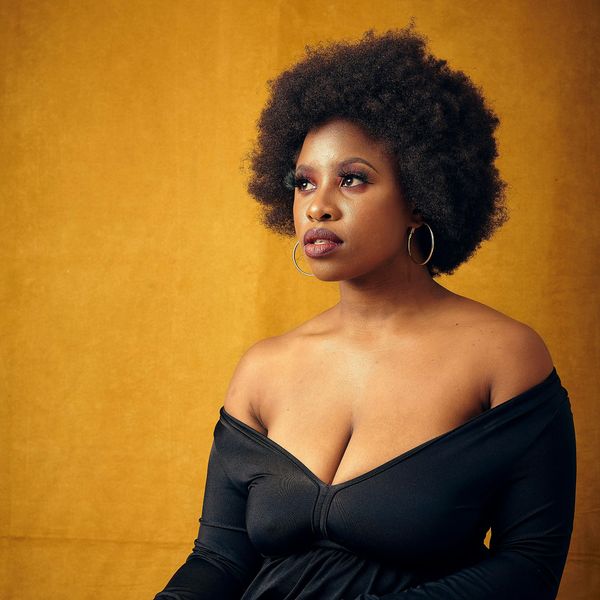What Is The 'Johari Window' And Why It's Bomb When It Comes To Increasing Self-Awareness

Not too long ago, while in an interview, someone asked me to share what I think is an extremely overlooked reason why a lot of relationships are either unhealthy or don’t end up seeing the distance. Without even a bit of hesitation, I said that far too many people lack even a “kiddie pool level” of self-awareness — and it’s costing them…dearly.
Almost four years ago, I penned an article for xoNecole, "These Are The Things Self-Aware People Do Daily." There’s a quote inside that talks about self-awareness consisting of holding oneself accountable, and lawd, that’s an entire book and podcast series right there! However, when it comes to what we’re going to get into today, it’s another quote that comes to mind. Two psychologists by the names of Shelley Duval and Robert Wicklund say that self-awareness is “…the ability to focus on yourself and how your actions, thoughts, or emotions do or don't align with your internal standards” — and this is where the Johari Window fits in perfectly.
I must admit that it actually wasn’t until I saw an episode of Being Mary Jane back in the day that I even discovered what the Johari Window is. As far as the show goes, long story short, Mary Jane needed to deal with some internal stuff that was causing her to stay in a loop in a lot of her relationships, and the window helped her out.
Since personally studying it, though, it’s something that I’ve done and also recommended to my clients in order for them to receive some of their own “ah ha moments” in their own neck of the woods. So, if you’re ready to get to know your own self a bit better, in hopes of flourishing more in your own interactions with other individuals, let’s do some unpacking of what the Johari Window is and how it can totally help you out.
What Exactly Is the Johari Window?
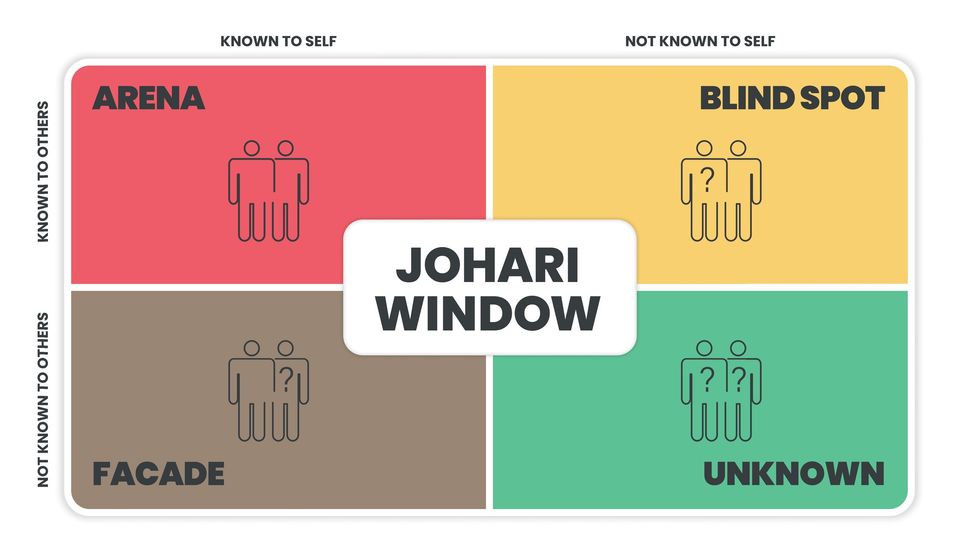
Getty Images
It’s kind of a long story, yet probably the best way to simplify everything. Back in the mid-1950s, two psychologists by the name of Joseph Luft and Harry Ingram came up with a concept that, in their minds, would help people to better communicate with others, especially when they are interacting in a group setting. It’s called the Johari Window, and Johari is actually the merging of their two first names.
Anyway, the ultimate goal of the Johari Window is to prove that awareness for yourself and trust from others can be better established once you are able to share how you perceive yourself while also being open to hearing feedback from others. In order for this to successfully transpire, there is a window that you must “look into,” and it’s broken down into four parts.
Now before we get into each windowpane, let me just say that it requires a lot of HUMILITY (and yes, I am yelling it) for this to be effective, especially when it comes to hearing what others have to say. This needs to go on record because if you truly want to tap into new levels of yourself, it’s not your job to go on the defensive, to become offended, or to shut down if/when you hear something that isn’t exactly easy or pleasant. Instead, remain open to how you may be perceived so that you can get to understand yourself and your relationships on a whole ‘nother level.
Are you ready to peek through each of the four panes now?
Johari Windowpane #1: Open Area
 Giphy
GiphyThe open area is just how it sounds. It consists of the things that you and those around you already know. On a surface level, this could be the details that are provided about you when someone reads your bio before you make a presentation. On a deeper one, it could be the common things that co-workers, church members, and acquaintances are clued in about, including certain personality traits, various personal skills, and your views and opinions about certain things.
So, let’s start here. Pull out a piece of paper, the notepad on your smartphone, or your journal, and, for 5-10 minutes, jot down all of the things that you think fit into this particular windowpane. For instance, when it comes to me, most people know that I am pretty black and white (in the sense of how I see things), that I have a quick wit and I’m very direct in communication, that I am a marriage life coach, doula and writer (especially in the realm of relationships) and that I have strong convictions when it comes to the covenant, being pro-Black, supporting Black men and folks taking great measures to self-heal. Whether I’m public speaking, writing an article, or in a conversation with someone for more than 15 minutes on a plane, these things are going to come up in some form or fashion.
The open arena is pretty easy to share because they don’t really put you in vulnerable positions as far as mental and emotional intimacy goes.
Johari Windowpane #2: Blind Spot
 Giphy
GiphyYeah, this is the one where people tend to get pretty testy. A blind spot is something that others may see about you that you don’t exactly perceive yourself. For instance, a few years back, when I decided that I wanted to get on the path of evolving in my femininity, I asked some of my male friends what they thought I needed to do to make that happen. One said that I needed to become a better listener. Another said that I needed to heal from some of the toxic female relatives in my life because whenever certain topics would come up, I was hard to communicate with — sometimes even combative. Another said that it would be cool to see me in some heels every once in a while (listen, put me in some Pumas, and I’m a happy girl!). Some others said some things that I would keep to myself.
Was it easy to take everything in? Nope. Blind spots rarely are because, just like a car can come into your blind spot while you’re trying to change lanes and almost cause you to get into an accident, oftentimes, when people tell you certain things about yourself, you won’t see them coming. However, they’re good for you to know because when you can get — AND RECEIVE — some intel into how you are seen by others, that can help you to either self-correct or come to a greater understanding of why 1) your relationships are the way that they are; 2) you keep finding yourself in the same patterns and outcomes that you get and/or 3) you aren’t going deeper in your dynamics with other people.
Yep. Opening your eyes to blind spots is where the big kids play.
Johari Windowpane #3: Façade
 Giphy
GiphyThere’s a guy I know who is a straight-up chameleon. He’s an entertainer here in Nashville, and it’s wild how much he is perceived to be a good guy on the surface, and yet — if he were to get 30 women who he’s “dated” (which is basically code for sexually involving himself with), they would have some pretty dark tales to share. On the surface, it comes off that he’s a player or womanizer; however, the few of us who know him beyond that image get that he’s got quite a bit of baggage and damage that causes him to act that way.
This is kinda-sorta where the next windowpane comes in. It’s called the façade, and it consists of the things that you know that others probably don’t — your past, your secrets, your fears, your deep-rooted feelings…your shady side. The interesting thing about this windowpane is even if you withhold it from others, eventually, something about it will creep out in how you act or react because it’s still a part of your core being.
For me, as I’m dealing with couples, the façade can be A LOT because it’s wild to realize how much a lot of partners tend to withhold from one another, whether it’s due to fear of how their spouse will respond or because they set up a “front” of who they were during the dating process and now they don’t know how to stop…acting.
Either way, you can’t develop genuine intimacy with other people if you’re not willing to release your façade (or façades). That said, think of some of the folks who you consider to be your tribe, and then write down some things that you have been hesitant to share with them. Then ask yourself why. Whatever answer comes to your mind will be quite revelatory about what you should do about those relational dynamics next. Trust me.
Johari Windowpane #4: Unknown
 Giphy
GiphyI’m currently working on getting certified and then credentialed in some other areas of coaching, one of which is trauma-related. The reason why I’m bringing this up here is that the final windowpane of not knowing is sometimes tied to trauma that has caused you to block some feelings or important information about yourself out.So, how in the world do you tap into what you — and others — do not know about you? Therapy can help. Life coaching too. Or you can spend some intentional time with someone you trust, talking about certain areas of your life until you receive some revelations about yourself.
For instance, you could set up a wine date with a girlfriend at your house, where the two of you make a plan to talk about your childhood and your childhood dreams. As you’re sharing with each other, I wouldn’t be surprised in the least if some things are revealed that one or both of you had totally forgotten about — whether it’s due to trauma, family pressure to suppress certain dreams or wants, or…life simply getting in the way.To me, the unknown is a lot like having dormant spots in your life. By acknowledging them, they can come “back to life” and quite possibly, with a little bit of focus and effort on your part, open up entirely new worlds for you.
5 Benefits of Doing the Johari Window Exercise
 Giphy
GiphyThe interesting thing about the Johari Window is, in many ways, like the beginning stages of life coaching, it was initially designed to help people interact better in group/corporate settings. However, when I watched how Mary Jane freaked it, that’s how I advised people to use it.
If you want to tweak it to apply to a work retreat or business meeting…by all means. First, though, try using it on a more personal note. Aside from all of the things that we already touched on via each windowpane, here are some other reasons why it could be one of the best self-help exercises that you’ve done in a while.
You will be a better communicator. You can’t have successful personal or professional relationships if you don’t communicate effectively, and the better you know yourself, the better you’ll be at expressing yourself. The Johari Window can help to make that happen.
You will be better at emotionally self-regulating. When it comes to blind spots and the unknown, both of those could explain (for example) why you get easily triggered, you are super-sensitive when it comes to correction, or you can’t seem to get a handle on your moods. Unfortunately, a lot of people chalk this kind of stuff up to “well, that’s just the way that I am” when the reality is part of what comes with emotional intelligence, and holistic maturity is knowing that you can absolutely control how you choose to respond and react to things. Getting to know your blind spots and unknown areas plays a big role in that.
You will feel more genuine when interacting with others. Some people define intimacy as knowing and being known. That said, it’s pretty difficult to be truly intimate with someone if you’re hiding parts of yourself or you’re putting up a façade. When you’re willing to give healthy and trustworthy individuals more authentic access to you, that is what makes your relationships more secure and reliable.
You will be able to make better decisions (faster). A part of the reason why some people struggle with the decision-making process is that they are always second-guessing themselves. Oftentimes, that’s because they care too much about what other people think, or they’re not clear enough about what their own standards, boundaries, or needs are. Oh, but believe you me, the better you know yourself, the easier it is to decide which people, places, things, and ideas will complement you and your life. I think that you can see that this is just one more way that the Johari Window can be of service.
Your self-esteem will skyrocket. Imagine how much more confident you will become once you can take honest feedback and apply it. I’m telling you, being able to hear about yourself may not always be easy but when you do it, it reveals that you’re willing to grow at the expense of simply feeding your ego all of the time — and that can make you unstoppable in so many ways and on so many levels.
—--
You know, I can’t think of one person who has walked this through and has not received some real insights on themselves — ones that have made them a better person and a better person to interact with.
So, over the next couple of weeks, treat yourself to the Johari Window exercise. Be open to what you learn — and, at the expense of punning, let the light of the window shine right on through, sis.
Let’s make things inbox official! Sign up for the xoNecole newsletter for daily love, wellness, career, and exclusive content delivered straight to your inbox.
Featured image by Westend81/Getty Images
This Is How To Keep 'Holiday Season Stress' From Infecting Your Relationship
Hmph. Maybe it’s just me, but it seems like there is something really weird happening in the fall season air (because winter doesn’t officially begin until December 21) that cuddle season is in full swing while break-up season is as well. In fact, did you know that break-ups are so popular during the holiday season that December 11 is deemed Break-Up Day?
The reasons why relationships shift around this time vary; however, I did both roll my eyes and chuckle when I read that a very popular one is because it’s an easy way to get out of getting one’s significant other a Christmas present. SMDH.
Anyway, I personally think that the less shallow folks out here may contemplate calling things “quits” or they at least distance themselves a bit from their partner (and what I’m referring to is serious relationships) due to all of the stress and strain that oftentimes comes with the holidays whether it be financial, familial, due to their tight schedules or something else.
Listen, I would hate for you and your man to miss the fun and happiness of experiencing this time of year, all because you are so overwhelmed or irritated that you can’t really enjoy it. That’s why I have a few practical tips for how to avoid allowing the typical holiday season stress from INFECTING your relationship.
Manage Your Expectations
 Giphy
GiphyUnmanaged expectations. If there is a main reason why the holiday season tends to be so stress-filled for so many people, I’d bet good money that this is the cause. And when you’re in a long-term relationship, expectations can manifest themselves in all sorts of cryptic and/or unexpected ways. You might have relatives who assume that you are going to be with them for Thanksgiving or Christmas when you have other plans in mind. You might be thinking that you are going to spend one amount for presents while your man is thinking something totally different. When it comes to scheduling, your signals may be crossed.
And you know what? To all of these scenarios, this is where clear and consistent communication come in. Don’t assume anything. Don’t dictate anything either. From now until New Year’s, mutually decide to check in once a week, just to make sure that you are both on the same page as it relates to the holidays and what you both are thinking will come along with it. The less blindsided you both feel, the less stressed out you will be. Trust me on this.
Set (and Keep) a Budget
 Giphy
GiphyOkay, so I read that last year, 36 percent of Americans incurred some type of holiday-related debt. Hmph. Last year, there was still some sense of normalcy in this country, chile, so I can only imagine what finances are gonna look like over the next several weeks. That said, since I don’t know a lot of people who don’t find being broke stressful, make sure that you and your bae set a budget and then stick to it this year — no ifs, ands or buts.
Because really, y’all — it doesn’t make sense to deplete savings and/or max out credit cards for a few days of giggles only to be damn near losing your mind because you don’t know how to make ends meet come Dr. Martin Luther King, Jr. Day.
And by the way, this tip doesn’t just speak to things like food and gifts; I also mean travel. If it doesn’t make a ton of sense (or cents) to be all over the place this year — DON’T BE.
Keep Matthew 5:37 at the Forefront
 Giphy
GiphyIf off the top of your head, you don’t know what Matthew 5:37 says, no worries, here ya go: “But let your ‘Yes’ be ‘Yes,’ and your ‘No,’ ‘No.’ For whatever is more than these is from the evil one.” That verse right there? Oh, it’s a boundaries lifesaver! I say that because do you see “maybe” or “I’ll think about it” in there? Nope. LOL. It says that you should tell people “yes” or “no” and leave it at that — and that complements Anne Lamott’s quote, “’No’ is a complete sentence” impeccably well. Yeah, you’ve got to remember that anything beyond a yes or no to a request is privileged information; you don’t owe anyone details or an explanation.
Besides, if you are really honest with yourself, when someone asks you something and you give a “Umm, let me think about it” kind of reply, more times than not, you already know what your answer is going to be — so why not let you both off of the hook? Give your response. Commit to that. And let everyone (including yourself) get on with their lives and schedules.
I promise you that when it comes to those holiday parties, you are pissing more folks off by not RSVP’ing or doing so and not showing up than just saying, “Thank you but not this year” off the rip.
Remember That Your Personal Space Is Privilege Not a Right
 Giphy
GiphyA friend of mine recently bought a new house and invited me over to come see it. He’s a single man with no children, so as I was taking in all of the space that he had, especially as I walked through his finished basement, I joked about relatives coming to live with him. “Hell no” and “absolutely not” were pretty much his immediate responses as he went on to say that some folks even had the nerve to be offended when he told them that he had no intentions on taking DNA in.
Ain’t it wild how people think that your stuff is their right? And yes, that brings me to my next point. Your home is your sanctuary space. If you want to host folks this year — cool. If not, ALSO COOL. Please don’t let folks (family included) guilt you into how they want you to act or even into what they would do if the shoe was on the other foot. You are not them — and as one of my favorite quotes states, “If two people were exactly alike, one of them would be unnecessary.” (A man by the name Larry Dixon said that.)
Hell, my friends? They know that I am good for sending them random things that they need or even want all throughout the year. Coming over to hang out at my pace, though. Uh-uh. Chalk it up to being a card-carrying member of the ambivert club yet I like keeping my living space personal — and I sleep like a baby, each and every night, for feeling that way.
Always remember that your space, your time, your resources, your energy and shoot, yourself period (including your relationship), are all things that are your own. You get to choose how, when and why you want to share them. The holiday season is certainly no exception.
Cultivate Some “You Two Only” Traditions
 Giphy
GiphyIt’s not uncommon for some couples to hit me up after the holiday season to “detox.” Sometimes it’s due to the financial drama (and sometimes trauma) that they experienced. Sometimes it’s because they allowed their relatives (especially in-laws) to get more into their personal business than they should’ve. More than anything, though, it tends to be because they didn’t get enough quality time together and so ended up feeling “disconnected.”
Please don’t let that happen. Listen, I’m not even a holidays kind of woman and yet, I will absolutely sit myself down with some hot chocolate and chocolate chip cookies to enjoy a Hallmark holiday film or two. Aside from the fact that most of them are lighthearted and sweet, I also like that they usually focus on couples loving on each other amidst all of the holiday beauty and ambiance — which is something that all couples should set aside some time to do.
Maybe it’s a vacation. Maybe it’s a staycation. Or maybe it’s my personal favorite, A SEXCATION. Whether it’s for a few days, the weekend or even overnight — don’t you let the holidays go by without setting aside time for you and your man to celebrate one another. Don’t you dare (check out “Are You Ready To Have Some Very Merry 'Christmas Sex'?”).
GET. SOME. REST.
 Giphy
GiphyI once read that 8 out of 10 people get stressed out over the holidays and 3 out of 10 lose sleep during to it — and when you’re stress-filled and sleep-deprived, that can absolutely lead to hypersensitivity, making mountains out of molehills and even not being in the mood for sex.
Your relationship can’t afford to go through any of this, so definitely make sure to prioritize rest. I don’t care how unrealistic it might seem during this time, sleep should never be seen as a luxury; it will always and forever be a great necessity.
That said, try to get no less than six hours of shut-eye in (check out “6 Fascinating Ways Sex And Sleep Definitely Go Hand In Hand”) and even ask your bae to take a nap with you sometimes (check out “Wanna Have Some Next-Level Sex? Take A Nap, Sis.”). Not only will sleep help to restore your mind, body and spirit but, when it’s with your partner, it’s an act of intimacy that can make you both feel super connected, even in the midst of what might feel like chaos.
___
Holiday season stress is real. Still, never give it the permission or power to throw your relationship off. Put you and your man first and let the holidays be what they are gonna be, chile.
Let’s make things inbox official! Sign up for the xoNecole newsletter for love, wellness, career, and exclusive content delivered straight to your inbox.
Featured image by Shutterstock
“Late” is an interesting word. I say that because, based on the situation, being late can actually be subjective.
For instance, if you agree to show up somewhere at 11:30 a.m. and you pop in at 11:45 a.m., you are absolutely late. No wiggle room there. Yet when it comes to something like an apology? I mean, when you factor in a definition for late like “occurring, coming, or being after the usual or proper time” — how do you determine when the proper time should be? Is it supposed to be when you want to hear it, or when someone is ready to offer it and actually means the words behind it?
And that is why I decided to put emphasis on the word “late” for today’s topic. Because if you and someone break up and they approach you, well after the fact, with an “I’m sorry,” if you struggle with whether or not to accept it due to the timing of it all, you should definitely ponder that a bit.
And as you’re doing so, it might help to read a bit deeper into what an apology should look and live like, even from an ex, regardless of when it shows up.
Your “late.” Or his right on time.
Three Things That a True Apology Consists Of
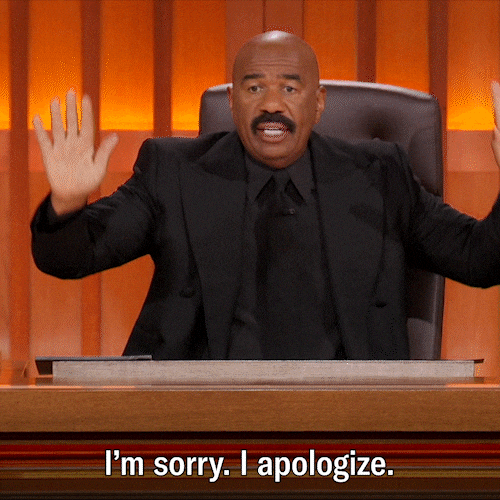 Giphy
GiphyIt’s kind of wild that when you work as a therapist/counselor/coach, a lot of people never really see you as human — and this can include your close relationships. What I mean by that is, it’s almost like they expect you to be free on-call therapy to the point where they “forget” to actually check on you sometimes.
Such is the case with one of my longest-running friendships. Even during the weeks between losing my mother and losing $4K (SMDH), she would just keep calling me to vent about her marriage. I finally got so fed up that I brought it to her attention that for the past couple of years, that is exactly what our friendship has been like: her venting, me listening without her being very invested in my life at all. In response, she texted me an apology — and boy, was it beautiful.
I’m not going to share the details of what she said; however, I am going to tell you three things that it consisted of because it’s what I believe ALL APOLOGIES should entail.
1. She took full ownership for what she believed that she did. I framed this point in this way because, something that everyone needs to forever keep in mind is the fact that two people start and, to a large extent, end relationships — and what I mean by that is, it’s never like one person was perfect and the other was the villain. That said, though, when someone is making an apology to another individual, they are going to own their part and articulate what that part is. It’s not gonna be a simple “My bad.”
It’s going to be “I am really sorry that I wasn’t there for you when you needed me” or “I apologize for taking you for granted” — something that sounds like they get the “offense” that transpired. By doing this, they recognize their missteps — and that is what puts people on the road to not repeating them.
2. She did not deflect or gaslight me. You know what one of the worst apologies are: It’s when someone says they are sorry and then follows it up with, “But you do it too” or “If you hadn’t done ‘A’, I wouldn’t have done ‘B.'” Justifying your actions is a surefire way to make someone believe that you don’t really think that you did something wrong (or that bad) in the first place. And really, how can they trust you (again) if that is how you feel? Oh, and don’t get me on gaslighting.
Ugh, ain’t nothing like someone claiming that they want to set things right with you, only to act like they don’t really get where you are coming from with the issues y’all were having in the first place. A good gaslight line in an apology: “If that is what you think happened, I apologize.” Yeah, you can keep that, jack. Never accept this kind of apology — because it isn’t one.
3. She addressed why she needed to make the apology in the first place. Wanna know one of the main reasons why I don’t trust people who don’t believe in having regrets (check out “Why Regret Might Not Always Be A Bad Thing”)? Did you know that apology means “a written or spoken expression of one's regret, remorse, or sorrow for having insulted, failed, injured, or wronged another.” How, as a human, do you think that you are out here not making any mistakes or poor decisions that you sometimes need to APOLOGIZE for? That is just…insane.
And one of the reasons why apologies are important is because if you feel bad about “failing” someone, it’s usually because you value them enough to want to keep them around. And yes, in my friend’s apology, she also explained why she didn’t want me to feel hurt in the way that she had hurt my feelings and what she would do to prevent that from happening in the first place.
So y’all, with all of this out of the way, before getting deeper into this topic? If an ex is hitting you up to apologize to you for something, please make sure that he hits all three marks of a true apology.
Now let’s keep going.
A Genuine Apology Should Also Include an Amends
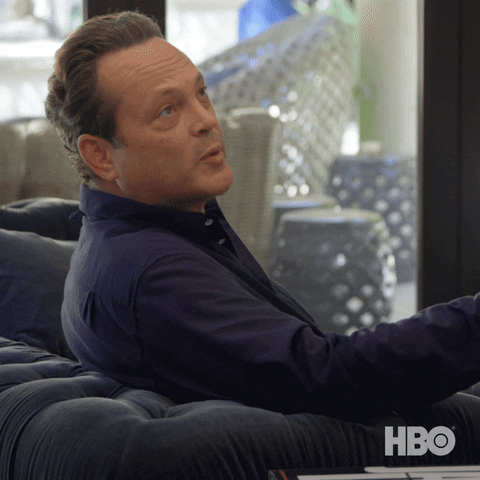 Giphy
GiphyA few years ago, I wrote an article for the platform entitled, “Heads Up: It's NOT An Apology If An Amends Isn't Made.” You know how I mentioned a second ago that a solid apology has no gaslighting in it? Hmph. Ain’t it wild how someone can do something that hurts or harms you and yet, they want you to just “hurry up and get over it”? GASLIGHTING.
Someone in my family, after unpacking years of abuse that I experienced at their hand, they had the nerve to say, “I’m not going to keep apologizing to you for this.” Hmm…Okay. So, how about you let me give you a consistent three months’ worth of the years of mistreatment that I experienced from you and then flippantly throw an apology your way. Let’s see how you feel about it. How much you believe that I am being genuine and sincere.
Listen — and please hear me GOOD on this: when someone really gets the magnitude of the pain or discomfort and inconvenience that they caused, they aren’t going to be fine with just saying that they are sorry for it; they are going to ask you what they can do to set things right.
It’s actually a part of the reason why I named the four children who I aborted (check out “Why I Named The Children I Aborted”) because I do have some real remorse for those decisions. Each of their names have an intentional meaning and I strive to leave out their purpose, through those names, on a daily basis. It’s a small way of making amends.
You know, back when my first book came out, my first love reached out, via email, to send me an apology. The apology hit most of the points that I mentioned earlier. Looking back, there wasn’t an offer to make an amends, though, and trust me, there was A LOT to make up for.
At the end of the day, amends means “reparation or compensation for a loss, damage, or injury of any kind; recompense” and while none of us should use bitterness, resentment or emotional stagnation as the “bar” for which we should expect amends to be made, if you’re trying to figure out just how sincere an ex is with their apology, if they want to do something to make things better, that’s a good sign.
There is a caveat, though.
Discern the Motives. Always.
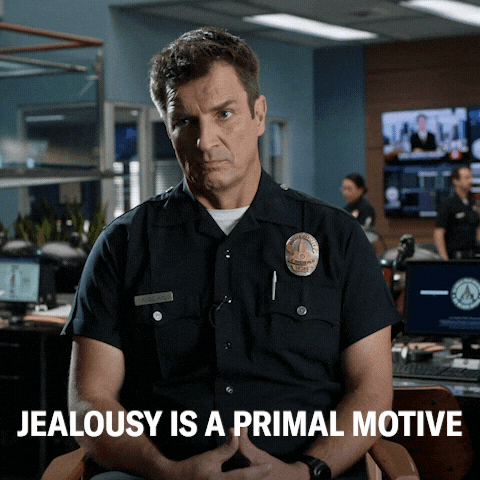 Giphy
GiphyEarlier this summer, I wrote an article for the platform entitled, “What's Your Motive For Sex? (It Reveals A Lot. Trust Me.)” Then, a few weeks ago, I wrote another article entitled, “As Cuffing Season Steadily Approaches, What The Heck Is 'Winter Coating'?” and boy, when I tell you that both of these complement this point really well? Goodness.
If you’ve never heard of the dating trend known as winter coating before, it’s basically when an ex creeps back up around cuffing season — and if you know what cuffing season is all about, you can absolutely connect the very probable motives behind those dots.
Now can there be exceptions? There are ALWAYS exceptions. Still, if you haven’t heard from your ex in years and here he comes a couple of weeks before Christmas, unless the two of you got together or broke up around the holidays, stay on potential “winter coating alert,” because it might not be about “building bridges” so much as getting into your bedroom.
That said, if it’s been a minute (six months or more) since you’ve heard from an ex and he suddenly reaches out to apologize, absolutely take out a moment to discern the motive — and shoot, feel fine with even asking what is causing him to make the move…now. If it’s in the spirit of the holidays and wanting to go into a new year with a clean slate, got it. If it’s because he’s been in therapy and realizes that he didn’t end certain things in his past very well, understood. If it’s because he didn’t like how the two of you broke up and he wants to try and make peace, that’s fair.
On the other hand, if you sense that he wants to rekindle something (check out “Nelly And Ashanti Are Giving It Another Shot? Here's What You Should Know About 'Ex Reconciliation'” and “I'm Thrilled That Ryan Destiny & Keith Powers Are Back Together. 5 Things Before Reuniting With Your Ex, Tho.” and “What Happens When 'The One Who Got Away'...Comes Back?”) — although that’s kind of another article for another time, do check that motive.
When someone apologizes, you should really be the only focus for them; not what they can get out of it on the back end. Listen, even if he hopes to get back with you (or back in bed with you), that shouldn’t be something that is discussed during the apology. If it is said or even implied, something about HIS MOTIVE is disingenuous. And if that is indeed the case, to a valid extent, so is he.
We All Should Give the Grace and Mercy That We Desire
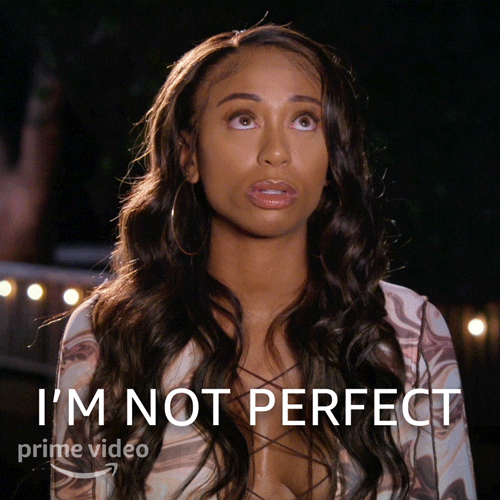 Giphy
GiphySooner than later, I’m going to write an article about forgiveness (beyond what I already have here). For now I’ll just say that if you are someone who thinks that other people don’t deserve forgiveness? That is either your pain or your ego talking and, either way, you can’t trust “their” judgment.
All of us mess up sometimes and if you are a karma (or you reap what you sow) believer, then you absolutely should want to extend others grace and mercy so that you can receive it in your own time of need (and you are absolutely delusional if you think a time won’t come, sooner than you probably think, that you will need it).
Besides, do you know all of the self-inflicted drama and trauma that comes from NOT forgiving others: higher blood pressure, insomnia, stress, anxiety, the higher risk of a heart attack, a weakened immunity, a greater risk for depression and anxiety — whatever he did, is it really worth all of this? Yeah, while a lot of people think that weaponizing forgiveness is empowering, really all it’s doing is putting themselves in harm’s way. Physically. Emotionally. SPIRITUALLY: “For if you forgive men their trespasses, your heavenly Father will also forgive you. But if you do not forgive men their trespasses, neither will your Father forgive your trespasses." (Matthew 6:14-15 — NKJV)
By the way, no one is saying that forgiving that man means that you have to allow him back into your life. After all, access is a privilege. Yet if he comes to you and acknowledges that he feels sorry for some things, for the sake of your own sanity, why not let him express it? Don’t wanna meet up or talk on the phone? Understood. Email and/or text are there for the taking. Don’t want to go back and forth? Who said that it needs to be a discussion or a debate?
All I know is, the more time you spend on this planet, the more you want to put out the energy that you want to come back. Forgiving others tends to make life easier. Not forgiving? Oh, the way that it boomerangs, sometimes in ways you never saw coming, chile. Dodge that kind of experience (and typically hard life lesson) if you can.
Yes, Better Late than Never
 Giphy
GiphyToo late to apologize. Yeah, I don’t really know if there is such a thing (because forgiving and reconciling are not one in the same and some of y’all will catch that later). I’ll wrap this up with a story to prove my point.
Once upon a time, I knew a woman who was in a serious relationship and yet, whenever her boyfriend would bring up the possibility of marriage, she would stall him out. When I finally asked her what her deal was, she explained that she still harbored so much pain from the man before him that she didn’t fully trust that he was the real deal. About five months later, here came her ex with a thorough explanation for why he made some of the decisions that he did while they were together. Now that she had the full story, she was able to heal. She got married to her boyfriend that following year.
You see where I am going with this? Although your ex’s apology might be “late” as far as y’all’s relationship timeline, the timing may be BRILLIANT when it comes to true when and why you actually need it. Yeah, a Scripture that I adore is “Timing is the Father’s business” (Acts 1:7 — Message) and sometimes those apologies, in the grand scheme of things, are more on time than you could ever imagine; they’re when God deems you need them not when you want to have them.
____
It is Oprah Winfrey who once said, “True forgiveness is when you can say, "Thank you for that experience” and sis, if you remove the bitterness and anger and look deeper, there were valuable lessons, even in and from the most challenging relationships. And that is worth appreciating through forgiveness and, if need be, full and complete release.
Bottom line, should you accept an ex’s late apology? Absolutely.
What better way to illuminate your present on a whole ‘nother level.
Just as forgiveness always does.
TRUST ME.
Let’s make things inbox official! Sign up for the xoNecole newsletter for love, wellness, career, and exclusive content delivered straight to your inbox.
Featured image by Shutterstock



